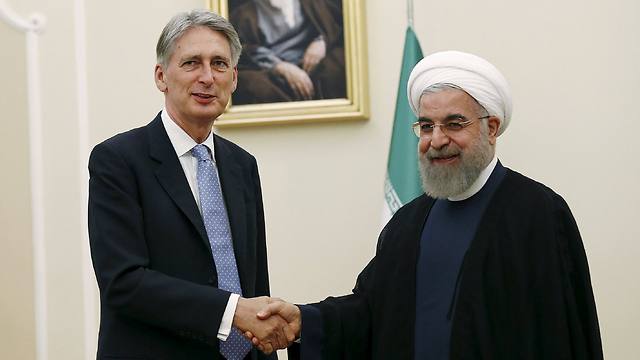
LONDON - Britain's Foreign Secretary Philip Hammond said Monday that the current Iranian government had displayed a more nuanced approach than its predecessor to Israel, adding that Tehran would be judged on its actions, not its words.
"What we're looking for is behavior from Iran, not only towards Israel but towards other players in the region, that slowly rebuilds their sense that Iran is not a threat to them," he said.
Hammond was in the Islamic Republic for the reopening of the British embassy in Tehran nearly four years after it was stormed by protesters.

While the historic step marks an easing of tense relations between the Islamic Republic and Western powers, Hammond said there was still disagreement on major issues.
"Iran is too large a player, too important a player in this region, to simply leave in isolation," Hammond told the BBC.
"We should tread carefully. There's a deep legacy of distrust on both sides and we have major areas where we have very substantial policy differences," he said.
He said that while both countries agreed on the need to tackle jihadist group Islamic State, there were disagreements on human rights issues.
"The thing we disagree on is the role of one single person, Bashar al Assad, in this process. But the important thing is we are talking.
"If we are going to get to a political solution we have to have the Iranians and the Russians engaged in that process too," Hammond said.
He said Iranian President Hassan Rouhani, with whom he held talks, had sent out strong signals of a desire for dialogue and Iran wanted to turn a page in its relations with Britain and the West.
Hammond said preparatory work should be done ahead of lifting sanctions so investment can start to flow as soon as the measures are removed.
"We could be talking as early as next spring to start to see sanctions lifting off," Hammond said.
Also on Monday, German Foreign Minister Frank-Walter Steinmeier said he plans to travel to Iran in October, sending a strong signal that Europe's largest economy wants to quickly rebuild economic and political ties with the Islamic Republic.
Steinmeier's visit follows on from a three-day trip last month by Economy Minister Sigmar Gabriel, who became the first senior figure from a large Western government to visit Tehran since it struck a landmark nuclear agreement with world powers.
"I will be in Iran in October," Steinmeier said at the opening of a diplomatic conference in Berlin on Monday. A foreign ministry spokesman said talks about the trip were just starting and he could not give any concrete details.
Steinmeier said he understood the concerns of Israel and some Gulf countries about the agreement, but stressed that the deal would mean more, not less security, for the Middle East.
The Associated Press contributed to this report.
















